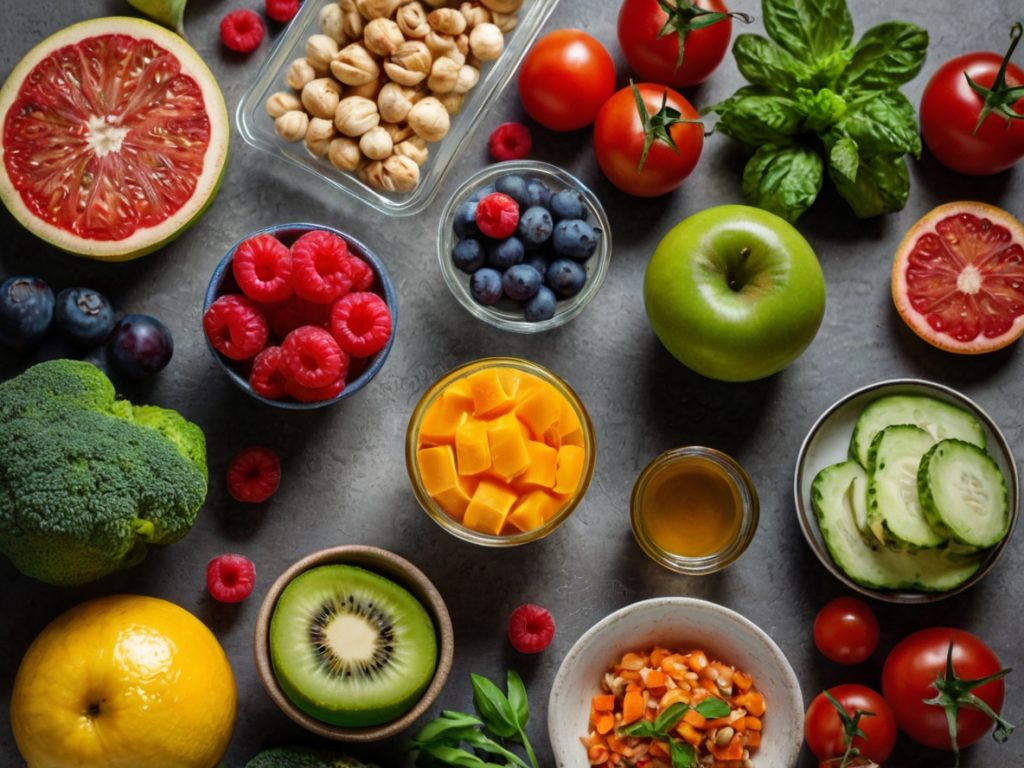Welcome to our guide on healthy food essentials for vibrant living! In this section, we will explore the vital aspects of healthy food and how it contributes to a vibrant lifestyle. We believe that nourishing our bodies with wholesome meals is the key to achieving optimal wellness.
At a time when our lives are becoming increasingly fast-paced, it has never been more important to prioritize our health. Incorporating healthy food choices into our daily routine can make a significant difference in how we feel and live.
From organic eating to clean eating, we will provide you with actionable nutrition tips and wellness recipes for a balanced diet. We believe in the power of nourishing meals and wholesome cooking techniques to fuel our bodies and support overall well-being.
The Benefits of Organic Eating
In this section, we will delve into the numerous benefits of incorporating organic eating into our lifestyle. By choosing organic foods, we not only prioritize our health and well-being but also contribute to the creation of a sustainable food system. Let us explore the reasons behind the growing popularity of organic food and how it can positively impact our lives.
Enhanced Nutritional Value
Organic foods are grown without the use of synthetic pesticides, herbicides, or genetically modified organisms (GMOs). As a result, they are rich in essential nutrients and have a higher concentration of vitamins, minerals, and antioxidants. By opting for organic fruits, vegetables, and grains, we can nourish our bodies with wholesome, nutrient-dense foods.
Promotes Health and Wellness
Organic eating can have a positive impact on our overall health. By avoiding the consumption of harmful chemicals and pesticides, we minimize our exposure to toxins and potential health risks. Organic foods are also free from artificial additives and preservatives, making them a healthier choice for individuals with sensitivities or allergies.
Supports Environmental Sustainability
Choosing organic foods supports sustainable agricultural practices, reduces pollution, and protects our natural resources. Organic farming methods promote soil health, conserve water, and help preserve biodiversity. By supporting organic producers, we contribute to a more sustainable and eco-friendly food system.
“Organic farming practices prioritize the well-being of the environment, farmers, and consumers. By choosing organic foods, we demonstrate our commitment to our health and the planet.”
Delicious and Flavorful
Taste is another benefit of organic eating. Organic fruits and vegetables are grown in nutrient-rich soil, which enhances their flavor and aroma. The natural cultivation methods used in organic farming allow foods to develop their unique taste profiles. By choosing organic, we can experience the true flavors of fresh, wholesome ingredients.
Supports Local Farmers
Opting for organic foods helps support local farmers and small-scale producers who adhere to organic farming practices. By buying organic produce from local markets or joining a community-supported agriculture (CSA) program, we contribute to the growth of organic farming and the local economy.
Organic vs. Conventional Foods
| Aspects | Organic Foods | Conventional Foods |
|---|---|---|
| Nutritional Value | Rich in essential nutrients due to organic farming practices | May contain residues of pesticides or fertilizers |
| Chemical Exposure | Reduced exposure to harmful chemicals and pesticides | Potential exposure to synthetic chemicals |
| Sustainability | Promotes sustainable farming practices | May contribute to soil erosion and water pollution |
| Taste | Enhanced flavors and natural taste profiles | Possible presence of residual chemical flavors |
| Supporting Local Farmers | Supports local organic farmers and small-scale producers | Supports conventional farming methods |
As we can see, organic eating offers numerous benefits for our health, the environment, and local farmers. By making conscious choices and incorporating organic foods into our diets, we can prioritize both our well-being and the well-being of the planet.
Embracing Clean Eating
When it comes to our health, one of the key factors is the food we consume. That’s why embracing clean eating is crucial for our overall well-being. Clean eating not only involves making mindful choices about the food we put on our plates but also prioritizing minimally processed ingredients and eliminating additives and artificial substances from our diet.
Choosing fresh, whole foods over processed options can have a significant impact on our health. It allows us to provide our bodies with the essential nutrients they need, while avoiding the harmful effects of additives and preservatives found in many processed products.
So, how can we incorporate clean eating into our daily life?
- Fill your plate with colorful fruits and vegetables: Aim to include a variety of vibrant produce in every meal. These nutrient-packed foods not only provide essential vitamins and minerals but also offer a multitude of health benefits.
- Opt for whole grains: Replace refined grains with whole grains like quinoa, brown rice, and whole wheat bread. These options are rich in fiber and provide sustained energy throughout the day.
- Choose lean protein sources: Incorporate lean sources of protein such as poultry, fish, beans, and tofu. These options are not only lower in saturated fats but also offer valuable nutrients for muscle repair and overall health.
- Minimize added sugars and artificial sweeteners: Be mindful of hidden sugars in processed foods and opt for natural sweeteners like honey or maple syrup. It’s important to read labels and choose products with limited amounts of added sugars.
- Prepare homemade meals: Cooking meals from scratch allows us to have control over the ingredients we use. It’s a great way to avoid processed foods and experiment with fresh and wholesome ingredients.
- Stay properly hydrated: Water is essential for our bodies to function optimally. Make sure to drink enough water throughout the day to stay hydrated and support your overall well-being.
By embracing clean eating and prioritizing nutrient-dense, whole foods, we can nourish our bodies and enjoy the numerous benefits of a healthy diet.
| Benefits of Clean Eating | Ways to Incorporate Clean Eating |
|---|---|
| Cleanses the body of toxins | Prepare homemade meals with fresh ingredients |
| Boosts energy and vitality | Stay properly hydrated with water |
| Supports weight management | Choose colorful fruits and vegetables |
| Enhances digestive health | Opt for whole grains |
| Strengthens the immune system | Minimize added sugars and artificial sweeteners |
Nutrition Tips for a Balanced Diet
When it comes to maintaining a healthy lifestyle, nutrition plays a vital role. Incorporating essential nutrients, practicing portion control, and adopting mindful eating habits are key components of a balanced diet.
1. Embrace a Variety of Healthy Foods
To ensure your body receives all the necessary nutrients, it’s important to consume a diverse range of healthy foods. Incorporate fruits, vegetables, whole grains, lean proteins, and healthy fats into your meals. This will provide a wide array of vitamins, minerals, and macronutrients necessary for optimal health.
2. Practice Portion Control
While enjoying meals, it’s essential to be mindful of portion sizes. Portion control ensures that you consume an appropriate amount of food, helping you avoid overeating and maintain a healthy weight. Use smaller plates, measure your food, and listen to your body’s hunger and fullness cues.
3. Opt for Nutrient-Dense Foods
Choosing nutrient-dense foods is crucial for a balanced diet. These foods are rich in vitamins, minerals, and other essential nutrients while being relatively low in calories. Examples include leafy greens, berries, nuts, seeds, and lean proteins. Incorporate these foods into your meals to maximize nutrition and minimize empty calories.
4. Stay Hydrated
Water is an essential nutrient required for numerous bodily functions. Ensure you stay hydrated throughout the day by drinking an adequate amount of water. Hydration not only supports digestion and nutrient absorption but also helps control hunger and maintain overall health.
5. Limit Processed and Sugary Foods
Avoiding or minimizing the consumption of processed and sugary foods is crucial for a balanced diet. These foods often lack essential nutrients and are high in added sugars, unhealthy fats, and sodium. Instead, choose whole foods and opt for healthier alternatives, such as fruits for dessert or homemade snacks.
“A balanced diet is not just about what you eat but also how you eat. Mindful eating helps you connect with your body’s cues, fostering a healthier relationship with food and improving overall well-being.”
6. Listen to Your Body
Pay attention to your body’s signals of hunger and fullness. Eating when you’re hungry and stopping when you’re satisfied helps maintain a balanced diet. Avoid mindless snacking and emotional eating by being present and aware during meals.
7. Seek Professional Guidance
If you’re unsure about your specific dietary needs, consider consulting a registered dietitian or nutritionist. They can provide personalized nutrition advice based on your health goals, medical conditions, and lifestyle.
| Nutrient | Function | Sources |
|---|---|---|
| Vitamin C | Supports immune system function and collagen production | Citrus fruits, berries, bell peppers |
| Calcium | Essential for strong bones and teeth | Dairy products, leafy greens, fortified plant-based milk |
| Protein | Builds and repairs tissues, supports muscle growth | Lean meats, poultry, legumes, tofu |
| Fiber | Aids digestion, promotes satiety | Whole grains, fruits, vegetables, legumes |
| Healthy Fats | Provides energy, supports brain function | Avocado, nuts, olive oil, fatty fish |
By following these nutrition tips and incorporating a variety of healthy foods into your meals, you can maintain a balanced diet and support your overall health and well-being.
Wholesome Cooking Techniques
In this section, we will explore various wholesome cooking techniques that prioritize the use of natural, nutrient-rich ingredients. Cooking from scratch is not only a satisfying experience but also allows us to have full control over what goes into our meals. By embracing these wholesome cooking techniques, we can create nourishing and flavorful dishes that promote a healthy lifestyle.
One of the key benefits of wholesome cooking is the ability to choose fresh, high-quality ingredients. By using locally sourced produce, organic meats, and whole grains, we can ensure that our meals are packed with essential nutrients. Incorporating a variety of colorful vegetables, lean proteins, and whole foods into our recipes will contribute to a balanced and wholesome diet.
When it comes to cooking techniques, there are several methods that help retain the nutritional value of ingredients. One such technique is steaming, which involves using gentle heat to cook vegetables without excessive loss of vitamins and minerals. Steaming also preserves the natural flavors and textures of the vegetables, resulting in vibrant and tasty dishes.
Another popular technique is roasting, which enhances the flavors of vegetables and proteins. By roasting vegetables at a high temperature, they caramelize and develop a rich, savory taste. This technique is particularly effective for root vegetables like carrots and potatoes, as well as proteins like chicken and fish.
Grilling is another wholesome cooking technique that adds a smoky and charred flavor to our meals. It is an excellent method for cooking lean cuts of meat, seafood, and even vegetables. Grilling allows the natural juices to remain intact while imparting a delicious smokiness, making our dishes healthier and more flavorful.
Lastly, we cannot forget about the importance of herbs and spices in enhancing the taste of our meals. Instead of relying on excessive amounts of salt and sugar, we can experiment with a variety of herbs and spices to add depth and complexity to our dishes. Not only do they contribute to the flavor, but many herbs and spices also have their own health benefits.
Wholesome cooking techniques empower us to create delicious and nutritious meals that support our well-being. By cooking from scratch, choosing high-quality ingredients, and using gentle cooking methods, we can enjoy a wholesome diet that promotes vibrant living.
The benefits of wholesome cooking techniques:
- Preserve the nutritional value of ingredients
- Enhance flavors and textures
- Promote the use of natural, nutrient-rich ingredients
- Allows control over the ingredients used
- Reduces reliance on processed foods
- Caters to individual dietary preferences and restrictions
Exploring Plant-Based Options
Incorporating plant-based options into our diet can offer numerous benefits for our overall health and well-being. Plant-based foods are rich in essential nutrients and can provide a wide array of flavors and textures to our meals. Let’s take a closer look at the various plant-based food sources and discover how they can enhance our diet.
Plant-Based Food Sources
The world of plant-based eating is incredibly diverse, offering a vast selection of delicious and nutritious options. Here are some popular plant-based food sources:
- Fruits and vegetables: Packed with vitamins, minerals, and fiber, fruits and vegetables are the foundation of a plant-based diet.
- Legumes: Beans, lentils, and chickpeas are excellent sources of protein, fiber, iron, and other essential nutrients.
- Nuts and seeds: Almonds, walnuts, chia seeds, and flaxseeds are nutrient-dense foods that provide healthy fats, protein, and minerals.
- Whole grains: Brown rice, quinoa, oats, and whole wheat pasta are nutritious options that offer fiber, vitamins, and minerals.
- Plant-based proteins: Tofu, tempeh, and seitan are versatile alternatives to animal-based proteins, providing a wide range of amino acids.
Benefits of Incorporating Plant-Based Meals
Introducing more plant-based meals into our daily routine can have numerous benefits:
- Healthy food: Plant-based meals tend to be lower in saturated fat and cholesterol, making them heart-healthy choices.
- Rich in nutrients: Plant-based foods are packed with vitamins, minerals, and antioxidants that bolster our immune system.
- Fiber-rich: A plant-based diet is typically high in fiber, promoting digestive health and reducing the risk of chronic diseases.
- Sustainable choice: Choosing plant-based options contributes to a more sustainable food system, reducing both greenhouse gas emissions and water usage.
- Versatility: Plant-based meals can be incredibly versatile and satisfying, offering a wide range of flavors and textures to suit diverse culinary preferences.
By embracing plant-based options, we can enhance the nutritional value of our meals while enjoying a wide variety of flavors and textures. Incorporating plant-based meals into our diet is an excellent way to prioritize our health and contribute to a sustainable future.
Conclusion
In conclusion, embracing a healthy food lifestyle can have a profound impact on our overall well-being. By incorporating organic and clean eating practices, following nutrition tips, exploring wholesome cooking techniques, and incorporating plant-based options, we can nourish our bodies and enjoy a vibrant and fulfilling life.
Organic eating offers numerous benefits, from better health to a more sustainable food system. Choosing organic foods allows us to reduce our exposure to harmful pesticides and GMOs while supporting environmentally-friendly farming practices.
Clean eating, on the other hand, emphasizes consuming minimally processed foods and avoiding artificial additives. By embracing clean eating, we can improve digestion, boost energy levels, and achieve a clearer mind.
Incorporating nutrition tips and maintaining a balanced diet ensures that our bodies receive the essential nutrients they need to thrive. Portion control and mindful eating also play a vital role in maintaining a healthy lifestyle.
Lastly, by employing wholesome cooking techniques and exploring plant-based options, we can create delicious and nutritious meals. Cooking from scratch allows us to control the quality of ingredients and retain their nutritional value, while incorporating plant-based options introduces a wide range of vitamins, minerals, and antioxidants into our diet.
Start your journey towards vibrant living today! By making small changes to our eating habits, we can unlock a world of wellness and happiness.
FAQ
What does it mean to eat ‘clean’?
Clean eating refers to a dietary approach that focuses on consuming minimally processed foods and avoiding additives, preservatives, and artificial ingredients. It emphasizes whole, nutrient-rich foods such as fruits, vegetables, lean proteins, whole grains, and healthy fats.
Why is organic eating important?
Organic eating is important because it promotes the consumption of foods that are grown without synthetic pesticides, fertilizers, and genetically modified organisms (GMOs). By choosing organic, you can reduce your exposure to potentially harmful chemicals and support sustainable farming practices.
How can I incorporate more plant-based options into my diet?
You can incorporate more plant-based options into your diet by including a variety of fruits, vegetables, whole grains, legumes, nuts, and seeds in your meals. Try replacing meat with plant-based proteins like tofu, tempeh, or legumes, and experiment with plant-based recipes to discover new flavors and textures.
What are some nutrition tips for maintaining a balanced diet?
Some nutrition tips for maintaining a balanced diet include consuming a variety of nutrient-dense foods, incorporating all food groups in appropriate portions, staying hydrated, and being mindful of your eating habits. It’s also important to limit added sugars, sodium, and saturated fats, and to choose whole, unprocessed foods whenever possible.
What are some wholesome cooking techniques I can practice?
Some wholesome cooking techniques include baking, steaming, grilling, and stir-frying. These methods help retain the natural flavors, textures, and nutrients of ingredients without the need for excessive oil or added fats. You can also experiment with spices, herbs, and natural seasonings to enhance the taste of your dishes.







